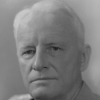Chester W. Nimitz

Chester W. Nimitz
Chester William Nimitzwas a fleet admiral of the United States Navy. He played a major role in the naval history of World War II as Commander in Chief, United States Pacific Fleet, for U.S. naval forces and Commander in Chief, Pacific Ocean Areas, for U.S. and Allied air, land, and sea forces during World War II...
NationalityAmerican
ProfessionWar Hero
Date of Birth24 February 1885
CityFredericksburg, TX
CountryUnited States of America
We shall never forget that it was our submarines that held the lines against the enemy while our fleets replaced losses and repaired wounds.
It is the function of the Navy to carry the war to the enemy so that it will not be fought on U.S. soil.
When I assumed command of the Pacific Fleet in 31 December, 1941; our submarines were already operating against the enemy, the only units of the Fleet that could come to grips with the Japanese for months to come. It was to the Submarine Force that I looked to carry the load until our great industrial activity could produce the weapons we so sorely needed to carry the war to the enemy. It is to the everlasting honor and glory of our submarine personnel that they never failed us in our days of peril.
Is the proposed operation likely to succeed? What might the consequences of failure? Is it in the realm of practicability in terms of material and supplies?
That is not to say that we can relax our readiness to defend ourselves. Our armament must be adequate to the needs, but our faith is not primarily in these machines of defense but in ourselves.
It is the function of the Navy to carry the war to the enemy so that it is not fought on U.S. soil.
No other island received as much preliminary pounding as did Iwo Jima.
Through the skill and devotion to duty of their armed forces of all branches in the Midway area our citizens can now rejoice that a momentous victory is in the making.
I have just taken on a great responsibility. I will do my utmost to meet it.
The best that science can devise and that naval organization can provide must be regarded only as an aid, and never as a substitute for good seamanship.
The enemy of our games was always Japan, and the courses were so thorough that after the start of World War II, nothing that happened in the Pacific was strange or unexpected.
Our present control of the sea is so absolute that it is sometimes taken for granted.
Hindsight is notably cleverer than foresight.
The U.S.'s major strength factor and weapon is its economy. If you cripple it, you cripple the military.